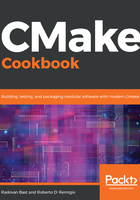
There is more
Sometimes there is the need to introduce options that are dependent on the value of other options. In our example, we might wish to offer the option to either produce a static or a shared library. However, this option would have no meaning if the USE_LIBRARY logical was not set to ON. CMake offers the cmake_dependent_option() command to define options that depend on other options:
include(CMakeDependentOption)
# second option depends on the value of the first
cmake_dependent_option(
MAKE_STATIC_LIBRARY "Compile sources into a static library" OFF
"USE_LIBRARY" ON
)
# third option depends on the value of the first
cmake_dependent_option(
MAKE_SHARED_LIBRARY "Compile sources into a shared library" ON
"USE_LIBRARY" ON
)
If USE_LIBRARY is ON, MAKE_STATIC_LIBRARY defaults to OFF, while MAKE_SHARED_LIBRARY defaults to ON. So we can run this:
$ cmake -D USE_LIBRARY=OFF -D MAKE_SHARED_LIBRARY=ON ..
This will still not build a library, since USE_LIBRARY is still set to OFF.
As mentioned earlier, CMake has mechanisms in place to extend its syntax and capabilities through the inclusion of modules, either shipped with CMake itself or custom ones. In this case, we have included a module called CMakeDependentOption. Without the include statement, the cmake_dependent_option() command would not be available for use. See also https://cmake.org/cmake/help/latest/module/CMakeDependentOption.html.